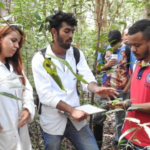
Marko Susimetsä, Vesa Parkkonen & Marja Laurikainen
The Republic of Kazakhstan has received a loan from the International Bank for Reconstruction and Development (World Bank) for the “Education Modernization Project” project (2017–2024) aiming to improve quality and equity in primary and secondary education. The KZEMP/QCBS-03 project with Häme University of Applied Sciences (HAMK) as the Lead Consultant provided technical assistance in designing and piloting a new initial teacher education model for pedagogical universities and in developing 30 new initial teacher education curricula. The authors of the article were the central actors in the curriculum evaluation team. This article describes the evaluation procedure and the central insights from the process.
Strengthening Initial Teacher Education
The KZEMP/QCBS-03 project (2020–2023) conducted a needs analysis that revealed the main development areas of initial teacher education in Kazakhstan. Based on the analysis, international benchmark and the latest research in teacher education, a new model for initial teacher education was created. The model was strongly founded on the paradigm shift from teacher-led to learner-focused and competency-based education and it contextualised teachers’ competence development described in the Multidimensional Adapted Process Model of Teaching and the new models of initial teacher education (see Darling-Hammond, 2006; Musset, 2010; MAP; Metsäpelto et al., 2020).
Based on the new model, 30 curricula were developed. The project involved 100 pedagogical developers from universities providing initial teacher education, who first went through an intensive capacitation process and then were the key actors in the curriculum design. The curriculum development was implemented in curriculum groups that included pedagogical developers and international and local key experts providing guidance and expertise. The groups were provided with a curriculum template that included the overall structure of the curriculum and some general parts that were common for all curricula, such as the cross-cutting pedagogical principles. Once the groups had finalised their curricula, they were sent to the evaluation process.
Conducting the Evaluation
For the process of curriculum evaluation, a team of key experts was selected, with expertise in curriculum design and evaluation processes related to education development.
To guarantee a systematic and transparent approach, preparatory meetings were held prior to the evaluation process to discuss the structure, timetable and context of the upcoming curriculum reform in Kazakhstan. The evaluation team agreed upon the principles of the evaluation process and the evaluation criteria. The reviewers evaluated each curriculum individually before coming together to collate their final evaluation for the curriculum groups. The focus of the reviewers was to provide clear feedback and advice so that the groups would get support to finalise the curricula for the official approval process in Kazakhstan. The evaluation was conducted from spring 2022 to early 2023.
Finally, the reviewers collated all the evaluation materials, meeting notes and final recommendations for each curriculum. These materials underwent a qualitative content analysis to draw together a set of insights and recommendations for similar future development projects.
Curriculum Evaluation Supporting Competency-Based Praxis
The transition from traditional subject-based to competency-based course descriptions presented the most challenges. The courses included sections for competence descriptions and competence outcomes. In many cases, the descriptions were subject-based, listing course activities or content, while the competence outcomes listed course assignments or their products. The reviewers recommended a revision of the course descriptions to provide an overall description of competences to be learned and their relevance in the students’ future occupational work. Similarly, the outcomes were instructed to be practical competences that the students would possess after the course – using Bloom’s, or similar, taxonomy to indicate different levels of competence.
Another challenge was the mismatch of the scope of course content in relation to the allocated ECTS credits. Some courses listed an excessive body of theoretical content, or the levels of competences were unrealistic for a single course to achieve. In some cases, the course outcomes were not aligned with the course title and goal, as evinced by, for instance, repeated references to general academic skills in many course outcomes. It is recommended that, in competency-based curricula, no two obligatory courses should repeat the same competence unless a later course develops the competence further (see Khanna et al., 2021; Bordeaux et al., 1977).
The evaluation process also revealed some differences between the Finnish and Kazakhstani approaches to teaching, guidance and counselling. The Kazakhstani courses were often based on traditional teacher-centred pedagogy and students were seen as individual task performers rather than members of learning communities with peer collaboration. Guidance and counselling were seen as mechanisms to solve students’ problems and put them back onto their career paths, rather than to support their individuality and growth into participating members of society.
However, it should be noted that the transition to student-centred approach and competency-based thinking is not a short process. A cultural change cannot be achieved within the span of a single development project: even in the UK and Finland, many education providers are still struggling with competency-based curricula, decades after their introduction (Byrne et al., 2012; Korpi et al., 2018). Overall, the Kazakhstani teacher education reform is well on its way and this evaluation shows true commitment to this process.
Lessons from the Evaluation Process
The overall design of the project agreed well with the evaluation process. It is essential to engage the local actors into the development work to ensure that the new pedagogical thinking is assimilated into the local education culture. Directly transplanting a curriculum and materials from one culture into another does not guarantee a successful adoption of new practices into local praxis. Finally, the authors wish to propose some ideas that are essential to a successful evaluation process.
Firstly, it is important to have all the evaluation materials available at the commencement of the evaluation process. This may not be easy when many teams are developing their own products and where small problems can lead to long delays. However, this would allow the reviewers to form a holistic impression of the materials and arrange an early pilot review to set the evaluation criteria and approach.
Secondly, insight into how the evaluation will affect the overall work – what kind of feedback is useful, what is unnecessary and what requires more explanation – will improve the usefulness of the evaluation. If this cannot be done before the evaluation process, then it could be a part of the above-mentioned pilot review.
Thirdly, as language is the mirror of culture, challenges caused by language barriers should be mitigated. In the current process, three different languages were used: Kazakh, Russian and English. The evaluators themselves had Finnish as their native and English as their second language. In the evaluation process, this spectrum of languages and cultures inspired many discussions. The evaluators were constantly reminded of the role of language as a cultural entity and the importance of a shared understanding of concepts and terminology in pedagogy and education reform.
Conclusion
Overall, education reform requires a solid support system to work. In this project, support to the curriculum groups was provided by international and local key experts, while the evaluation was conducted by reviewers unconnected to the rest of the project. This kept the reviewers impartial and objective in their feedback, but also posed challenges in the form of limited knowledge of the education culture and the general education level of the students in Kazakhstan. This process made it clear that language and cultural barriers cannot be ignored – we must be aware of them and provide the best feedback we can on the courses, their content and pedagogical choices, while allowing the local experts to make the final decisions on how they will utilise the support and feedback in their own development work.
Authors
Marko Susimetsä, PhD, HAMK Edu Research Unit, Key Expert for approbation of curriculum, KZEMP/QCBS-03 project.
Vesa Parkkonen, MSc (Business Administration), MA (Vocational Education), Senior lecturer in International Teacher and in Guidance Counsellor education, Key Expert for approbation of curriculum, KZEMP/QCBS-03 project.
Marja Laurikainen, MBA, Professional Teacher Qualification Education Development Specialist, HAMK Global Education, Project Manager, KZEMP/QCBS-03 project.
References
Bordeaux, A. F., Beck, R. L., Brannon, R. H., Mather, L. L. & Davis, J. T. (1977). Competency-Based Curricula: A Means to Effective Teaching. NACTA Journal, 1(3), 27–29.
Byrne, J., Downey, C. & Souza, A. (2012). Teaching and learning in a competence-based curriculum: the case of four secondary schools in England. Curriculum Journal. https://doi.org/10.1080/09585176.2012.731008
Darling-Hammond, L. (2006). Constructing 21st-Century Teacher Education. Journal of Teacher Education, 57(3), 1–15.
Khanna, R., Lele, G., Anandakrishna, L., Deshpande, A., Mathur, V. P., Muthu, M. S., Nirmal, L., Saha, S., Jayakumar, P., & Marwah, N. (2021). Development of a Competency-Based Curriculum for undergraduate education in Pediatric Dentistry: A systematic approach. Medical journal, Armed Forces India, 77(Suppl 1), S22–S30. https://doi.org/10.1016/j.mjafi.2020.11.008
Korpi, A., Hietala, R., Kiesi, J., Räkköläinen, M., & Politiikka-analyysiyksikkö. (2018). Ammatillisen koulutuksen osaamisperusteisuus, asiakaslähtöisyys ja toiminnan tehokkuus – Osaamisperusteisuuden tila. Valtioneuvoston kanslia. https://karvi.fi/wp-content/uploads/2018/01/Osaamisperusteisuuden-tila_KARVI_VNTEAS.pdf
Metsäpelto, R.-L., Poikkeus, A.-M., Heikkilä, M., Heikkinen-Jokilahti, K., Husu, J., Laine, A., Lappalainen, K., Lähteenmäki, M., Mikkilä-Erdmann, M., & Warinowski, A. (2020). Conceptual Framework of Teaching Quality: A Multidimensional Adapted Process Model of Teaching. DOORS Project Working Paper 21.2.2020.
Musset, P. (2010). Initial Teacher Education and Continuing Training Policies in a Comparative Perspective: Current Practices in OECD Countries and a Literature Review on Potential Effects, OECD Education Working Papers, No. 48, OECD Publishing. http://dx.doi.org/10.1787/5kmbphh7s47h-en





